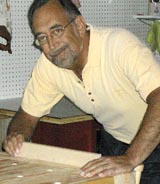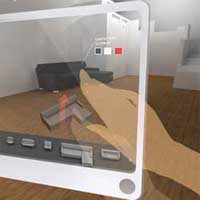
 by Steven D. Johnson
by Steven D. Johnson
Racine, Wisconsin
This month:
•
The Future of Woodworking — Part 1
•
Torsion Box Bench Hook
•
Sound Safety Tips — Noise Abatement
•
Major Milling — Step 1 to New Office Furniture
•
Reader Feedback
The Future of Woodworking — Part 1
Mark and Melanie are comfortably cuddled in their media nest, surrounded by a 360 degree 3D
interactive screen, shopping for new dining room furniture.
They selected accessories first, settling on a circa 1840 reproduction still life of fruit in a
genuine authentic reproduction wood-like frame and a pair of sconces with faux action candles. They
narrowed their search using verbal commands, then sorted through the computer-suggested options with
the slightest of finger-flicks. With each flick, a new option inserted itself upon their room
images, so they could see how each would look. When they decided on the perfect art and sconces, a
touch command finalized their selection and the computer then compared prices from various download
sources. Using their recently conjoined government bank credits, they made their purchase, and the
plans automatically downloaded to their HPZ3000X fabricator in the next room. The three dimensional
fabricator is busily building, layer by layer, the purchased items now, and the countdown clock in
the southwest quadrant of the screen shows that the sconces will be ready in less than twelve
minutes.

|
|
|
It is now time for Mark and Melanie to pick furniture. Using verbal commands, they narrow the
search parameters – "dining table," then "for four people," then "faux wood," since they both like
the "retro" look. Images appear immediately. With finger and hand gestures made in the air, Mark
and Melanie "whisk" away the ones they do not like and move the "possibles" to another quadrant of
the display. The computer responds immediately, helping to narrow selections based on previous
likes and dislikes. Soon they have narrowed their search to a handful of candidates, but none seems
perfect.
Melanie says, "If only that one on the left had a little thicker legs…" and Mark says, "Yeah,
that would be great…and maybe a little darker finish." They select the item, and begin the
modification routines. "Computer, make legs thicker." "Computer, make finish darker."
Soon, the table image is perfect, matching chairs have been selected, and they catalog and save a
matching buffet for purchase later, when more govbank credits are available. With the touch of a
finger the items are ordered, and a fabrication order is sent to a much larger fabrication machine
at a local fulfillment center down the street. Mark will be able to pick up the furniture
tomorrow.
Far-fetched? 3D fabrication "printers" are already in use, and the technology, like all
technology, becomes better and more affordable with each passing day. With something resembling
inkjet nozzles, layer upon layer of a three-dimensional object can be "printed" using plastic,
cellulose, or cement. Future material choices will expand, perhaps even to include that future
quaint and quirky retro-material, plastic ("Oh, that's so twentieth century!").
How far are we from widespread commercial "fabrication on demand?" Fifteen years, tops. Initial
commercialization of the technology will be small scale and expensive, but like all technology
power, speed, and availability will increase exponentially and costs will come down. Early-adopters
will pave the way, their purchases fueling more R&D and volume. It is only a matter of time.
Furniture designers of the future will work with far different tools than we do today. Pen and
ink have already been replaced by 3D modeling programs and saws and planes have been replaced with
laser cutters and 3D fabrication units in large commercial operations. A furniture designer in 2025
may live a long and productive life having never touched a real piece of wood, a saw, or a plane.
It is the inexorable and undeniable march of progress.
What will become of woodworking, woodworkers, and our hobby then? What will become of those
craftspeople that inspire and the neophytes who perspire and the vast middle ground of down to earth
woodworkers who enjoy this craft? It is the future that interests me most, and should interest you,
too.
Of course we can be amused (or bemused) by the quaint (or quirky) costume-wearing re-enactors who
wield their giant handsaw and chisel and wow crowds with their demonstrations of board-sawing and
mortise-making, and we can appreciate their efforts to keep tradition, if not fully alive, at least
alive in our collective psyches. But will their efforts fuel, or even sustain, the future?
The price of power tools and hand tools, and therefore the price of entry, into our hobby, will
necessarily increase. Once I laughed at the tongue-in-cheek drawing someone sent me of the
"OSHA-approved Cowboy." His horse had air bags, roll bars, warning lights, a back-up beeper, and a
funny-looking contraption at the back end that, uhh, mitigated the horse's environmental impact.
The cowboy had a hat that doubled as a protective helmet, complete with face guard and hearing
protection and his rope was covered with foam padding, lest his calf roping cause the young cows any
discomfort. I am not laughing lately. Like the cowboy, our power tools will soon require
significant additional redesigns in order to provide protection from ourselves.
Hand tools will not be exempt. There is a cost to warning labels and blade protectors, and an
even greater cost attributable to liability insurance. If you accidentally place your finger under
a mortise chisel before hitting said chisel with a mallet, you could not possibly be at fault; it
simply must be the responsibility of that irresponsible manufacturer that did not provide adequate
warning, training, precautionary messaging, and safety devices.
Cost of entry to this hobby will intersect with an even more troubling trend, that of a
collective disinterest among the youth of today for learning crafts. "Twittering" is not a craft.
In 2007 (the most recent data I could find) the Boy Scouts nationally awarded 82,274 merit badges
for "First Aid," 72,279 for "Environmental Science," and 13,702 for a merit badge called
"Computers." That same year, 4,621 "Woodwork" merit badges were earned. What are we doing?
Woodworking was less popular as a merit badge than Plumbing, Public Speaking, and Pottery. In fact,
woodworking only barely beat out Nuclear Science and Dentistry (there is a dentistry merit badge? I
wonder who gets to be the practice patient?)!
Everyone is aware of the demise of shop class in schools. Apprentice programs are passé, and in
large production shops, machinery has all but replaced individual craftsmanship. Programs such as
"Kids Workshop," sponsored by The Home Depot and held monthly at their stores, while laudable, is
often poorly attended. Intersecting forces will again affect our future. In a truly self-fulfilling
prophecy, decline in hobby participation will drive down tool sales volume, once again causing
prices to increase, making the hobby even more pricey for the "newbie" to enter.
Next month, in part 2, we will look at some ideas to reinvigorate our hobby, bring in fresh new
blood, and mitigate the growing "cost of entry." I welcome your feedback, ideas, and any success
stories, too. We will try to publish anything and everything we find that is helping to sustain our
craft and position it for growth, in the hopes that others can emulate your efforts.
Click here to read the 2nd part of the Future of Woodworking series.
Click here to read the 3rd and final part of the Future of Woodworking series.
(Page 1 of 5)
1
2
3
4
5
Next Page
Return to
Wood News
front page
